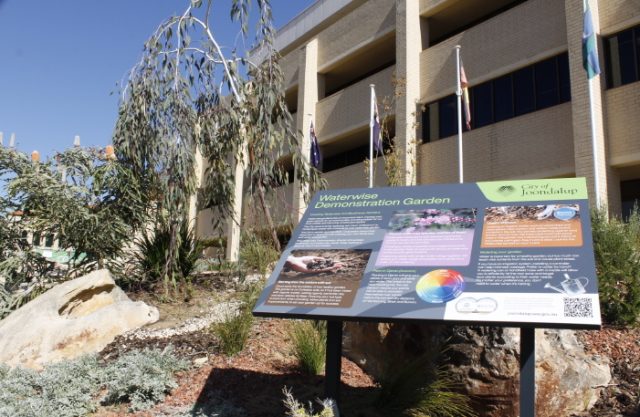Lawns are often used in home gardens and public open spaces for amenity and aesthetic reasons, however, with a warming climate and the increasing need to conserve water and cool down our streets, many people are opting to transform their lawned areas into waterwise and biodiverse gardens.
Waterwise gardens have so many benefits. Waterwise and native gardens not only save water, reduce the urban heat island effect, provide habitat for local wildlife and improve biodiversity, but they also provide many physical and mental health and well-being benefits for the entire community.
The City aims to promote waterwise and native gardens and their benefits through its many waterwise initiatives.
Joondalup Administration Building Waterwise Demonstration Garden
The City of Joondalup installed a waterwise and biodiverse native garden out in front of the City’s Administration Building in July 2023. The project was proudly supported by the Water Corporation and designed by The Forever Project.

The City of Joondalup Administration Building Waterwise Demonstration Garden
Growing local native plants
The front garden of the Administration Building was previously overgrown and required regular irrigation using groundwater. The exotic plant species were removed from the garden, but the native plants, such as the existing Silver Princess tree and mature Acorn Banksias, were retained.
The garden bed was transformed into a living waterwise landscape full of local flora species and a habitat for wildlife. Over 200 new native species were planted, such as Ground Banksia, Native Pigface and Tar Bush. A new Jarrah tree was also planted in the garden to provide shade and increase the urban tree canopy. Using all locally native species meant that the plants were adapted to the local soil conditions and climate.
The City encourages growing local native plants that suit your soil type. To find out soil type and discover local native plants that will thrive in your garden, visit our Growing Local Native Plants webpage.
Habitat for wildlife
The garden’s existing limestone rocks were retained so that they could continue to provide a habitat for the lizards and birds that frequently visit the garden.
Two gabion seats, filled with additional limestone rocks, were made and added to the garden. These seats not only entice visitors to sit and enjoy the garden but also provide additional protection to wildlife from the weather and predators.
A bird bath was installed in the garden to provide a water source for wildlife and add visual amenities. Small native birds such as the Djidi Djidi (Willie Wagtail) and the Bandiny (New Holland Honeyeater) are frequently seen enjoying the garden and the habitat it provides for them.
Visit our Protect our Wildlife resource to find out more ways to provide habitat and protection for wildlife.

Residents watched as the Administration Building Waterwise Demonstration Garden transformed into a Waterwise and biodiverse garden.
Residents attended to watch the transformation while The Forever Project delivered a presentation on creating Waterwise native gardens. Attendees learned about soil improvements and techniques, waterwise native plants, weed management and garden maintenance tips for them to take home to their own gardens.
Waterwise and firewise design
Alongside the native plants that require very little water, pathogen-free course mulch was used to retain moisture and also provide visual aesthetics. Recycled rock and rubble materials were used to form the garden’s pathway, which also meant the garden was a firewire design.
The garden now features educational signage full of waterwise gardening tips, local native plant species information, waterwise plant ratings and habitat ratings.

Signage highlights the species in the demonstration garden, their waterwise ratings and habitat overview.
Waterwise gardens green, beautify and cool our communities. Waterwise demonstration gardens like the City’s Administration building garden raise awareness of the importance of verges and gardens as green spaces that can provide canopy cover and habitat for wildlife.

Signage in the garden highlights waterwise gardening techniques, including soil preparation, plant selection and timing, mulching and watering tips.
Why Waterwise biodiverse gardening?
Whether it’s your verge, entire front garden or just a small garden bed around the side of your house, implementing a waterwise and biodiverse garden has so many huge benefits.
- You will save water.
- You will save time maintaining your garden. Waterwise native gardens often require less weeding, pruning, mulching, and hand watering.
- Your garden will look amazing all year round.
- Creates a climate-resilient and long-term sustainable garden.
- Provides habitat for wildlife, and you will enjoy many more birds, lizards, small marsupials and even frogs in your garden.
- Cool your home and counteract the urban heat island effect.
- Contributes to healthy drainage around your home.
- Improves the value of your property.
- Improves your and the community’s mental and physical health.
By creating waterwise gardens and requesting a free street tree from the City, you can help to create cool, green and biodiverse neighborhoods that combat the urban heat island effect and help build a sustainable and climate-resilient community.
Tips and resources
- Create a ReWild garden for wildlife and access resources and tips customized to your garden, visit Bring Nature Home • ReWild Perth webpage.
- Learn how to create a waterwise verge garden.
- Find out more through our waterwise verge garden guide and infographic.
- Find suitable plants for your local area and garden type.
- Learn about growing biodiverse and waterwise gardens.
- Search Water Corporations directory’s for waterwise plants, waterwise specialists and waterwise products.
- Find Waterwise gardening styles and inspiration, visit the Water Corporation low maintenance garden design for Perth website.
- For our previous Waterwise Rebate Program winners and to view their gardens, visit Waterwise Verge Garden Competition – 2023 Winners Announced – City of Joondalup.
- Get free mulch from the City using mulch vouchers or from Mulchnet. We recommend only using eucalyptus prunings from Mulchnet due to Polyphagous shot-hole borer risk with non-native mulch.
- Street Verge Guidelines.
- Apply for a free street tree on your verge Free street tree application.
